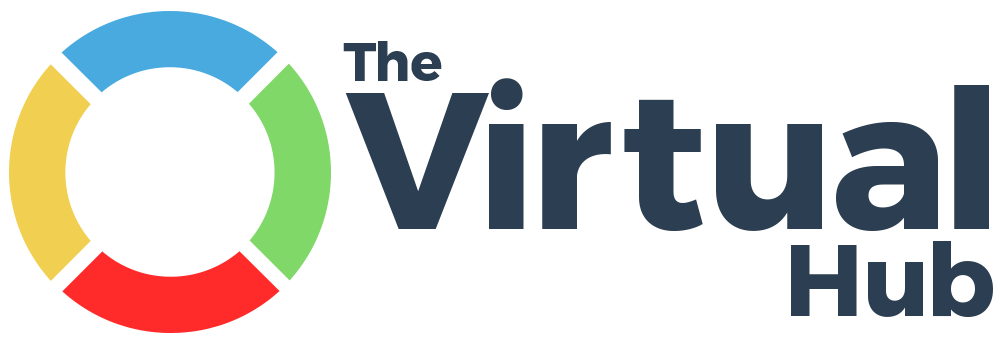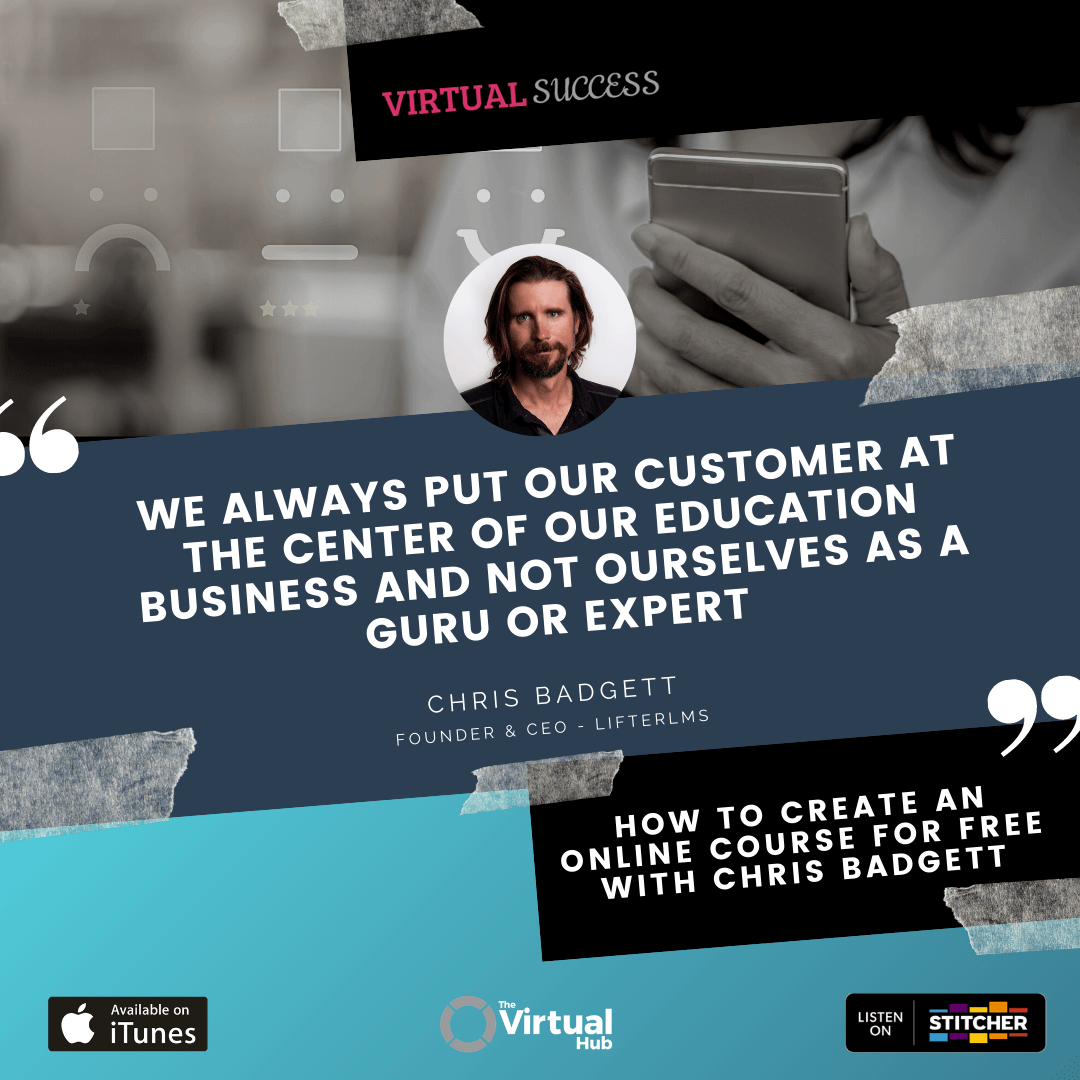How to Create an Online Course for Free with Chris Badgett
Want the transcript? Download it here.
In this episode, Barbara Turley speaks to Chris Badgett of LifterLMS about the process of creating your own online course and membership sites, and how this will help you and your business especially in the middle of a global crisis.
Some key points include:
- Getting your course ideas out of your head and actually creating them
- The minimum tech stack needed in order to start an online course or membership site
- Taking advantage of the current crisis and developing your business online
Let us know what your key takeout has been from this episode and join the continuing conversation over in the Virtual Success Facebook Group.
In this episode:
02:11 How to create an online course for free
06:22 SCIDL Method
09:58 How to avoid getting stuck with the Tech Stack
13:13 Taking advantage of the current crisis
17:20 What does it mean to Pivot your Business
18:30 Having the right Business Mindset this crisis
19:44 Wrapping things up
Intro: Do you find yourself running out of time to accomplish your work? Are you spending time doing things that you’re not that good at? There are effective ways to outsource these tasks so you can focus on your business. This is the Virtual Success Show. We bring the inside scoop on outsourcing success for entrepreneurs, by entrepreneurs. And now, here are your hosts, Matt Malouf, and Barbara Turley.
Barbara Turley: Welcome everyone to today’s episode of the Virtual Success Show podcast where today I am joined by Chris Badgett, who I’ve had on the podcast before, who’s the founder of the LifterLMS membership site plugin. And we’re here today to talk all about membership sites and why now is the best time ever for you to get your course out of your head onto a learning management system. Like something like Lifter and get it out to the world so obviously, I’m Barbara Turley, your host of the Virtual Success Show podcast and founder of The Virtual Hub. Chris, welcome to today’s show.
Chris Badgett: Thanks for having me, Barbara. I’m really excited to get into it with you today.
Barbara Turley: Yes, so look, you know, I know loads of people over time have always wanted to create membership sites, online courses and you know as well as I do that people get stuck not just with getting the course out of their heads but getting it onto the platforms, the tech stops people and usually business stops people in that you’re running the day to day running of your business stops you, so now is the best time I think, for a lot of businesses to try to pivot fast and go this route. We’ll talk about kind of the best businesses that can do that in a minute but I was really inspired by your- recently you did a four day course creation boot camp, I think you’d call it online and with the idea of to help people to get a course out of their heads, get out of the weeds and actually get the course created. Can you give us the short and dirty version of how do we do that? And how do we make it less overwhelming? Because it’s quite overwhelming to do it.
How to Create an Online Course for Free
Chris Badgett: Yeah, well, first, I just want to acknowledge the huge problem and this isn’t a new problem because if you think about it, if you’re watching this right now, just raise your hand or smash the like button or whatever, if you have ever thought about writing a book, but you never actually wrote the book. This kind of- this is an age old problem right here too, with creative entrepreneurs and people who want to innovate and are really passionate about a topic or helping a certain type of person. So I see unfortunately, a lot of people get stuck in the weeds of like they’re looking at the mechanism, they’re looking at the course or the membership site, or the coaching program that they’re going to put on the internet and they’re really focused on it. But then there’s this giant gap between, “Alright, I gotta get these tools and I got to do some marketing, I got to do some sales”, But first things first. I need to figure out which course to make, how to make it, how to structure it.
So we ran that four day, we call it a course design sprint challenge. I brought in a professional instructional designer from Europe to actually facilitate and lead the process. And really, the worst thing you can do is what I call going into the course creators cave. This is where we go into our home office and work on a course for months and for most people, it actually turns into years, and then it never actually launches or even if it gets built, it never gets like kind of publicly just done, it’s just kind of in, like that screenplay sitting in a box somewhere in your office. So the key to getting out of your head is to start with who, who are you going to help? Like a lot of times, with what I find to get people moving in unstuck is getting outside of the desire of making money online or having an online business. This is all good stuff, I’m not against it. But if we switch our mindset from this is what I need to I’m going to help this specific type of person achieve this specific type of results. It’s not about me and my expertise, it’s about you know, this target market and the result that I can dependably get them even in challenging circumstances, through content coaching and, you know, other resources.
Once we have that mindset, we can start reverse engineering from the result, the various milestones that this target customer needs to go through, that we’re going to help them achieve through courses, content, exercises, tools, resources, group coaching, private coaching community, all these things. We put our customer at the center of our education business and not ourselves as a guru or expert and then we guide them on that path. So, and the key to that which we did in the four-day design sprint challenge was doing it out in the open with real people part of the problem with the course creator cave is you don’t have a feedback loop open. So you got to get your target market involved you got to get their feedback, you got to you know, I love this idea of co-creating with the market. You might even adapt the curriculum as you go because you’re finding like there’s other gaps and things they need before they can move on to the next milestone you thought they needed. Well, I could keep going on and on like guide me Barbara.
Barbara Turley: I was about to say, like, you know, this sort of idea of creating it and actually it requires a lot of ready, fire, aim kind of approach a little bit beginning and for it not to be perfect and for you to be totally fine with that because you may need to go like, you might decide on module four is going to be this and then when people are going through it, you’re like, “Oh, we need to change that”. So I guess, maybe creating a live, I’ve often thought actually, should you just create like, you know, get 10 people who are interested in something and then get them together on a live Skype thing that’s just live and just do the initial course, sort of a live version of it, and then turn it into a course thereafter. It sounds to me like you should just do it on the fly.
SCIDL Method
Chris Badgett: Yeah, there’s actually a name for that. I’ve heard it called the Scidl Method, which stands for “Screw it, Do it live”, and what you do is you just figure out a way to get paid from- it’s not about getting a lot of people like you said, 10 people, 5 people, 3 people, it’s more about validating the idea. You could go and Skype, you go in Zoom, whatever you record it, that becomes the first version of your course and then you just keep improving it. I know course creators like, who have been launching the same course every year, twice a year for like 10 years and it gets better and better and better. I like to say that the course launch it’s not the finish line, it’s actually the starting line. And when we have that mindset, running that first version live like you’re talking about is a great way to get moving and get started with real people with a feedback loop open so that the course creators not in the cave, in a vacuum, you know, where all the dragons are that like, sabotage the project.
Barbara Turley: So this is this whole concept that you’ve been talking about actually, it’s like a collaborative approach with your ideal client or customer who you may already have, because that person might need or that company might need more help or whatever. So it’s about listening to the market, collaborating with them on creating what they need. And then being okay with the fact that the first iteration of that course might not be as slick and perfect as you want, but you’re getting feedback and you’re probably still creating a huge amount of value for people who actually take you up on the course offer. Guess that’s kind of where we’re going with it.
Chris Badgett: Totally, totally. My friend Danny says, “If you put some time constraints on it like you don’t have to create the transformational program, your life’s legacy, all your expertise in one”, that’s very dangerous. Imagine you’re on a plane from, Sydney to Los Angeles and that’s all the time you’ve got, maybe a shorter ride, maybe like a 2 to 4 hour ride, and your target market sits down, that person sits down in the seat next to you. And you’re going to help them get that result and you have four hours to do it by giving yourself that constraint that can also help you with not putting, trying to put cram too much into the program, especially the first version.
Barbara Turley: Well, I guess the way to do that then is to have a launch date and to announce it, we’re starting in two weeks time.
Chris Badgett: That’s all we did with a four day boot camp we had we had nothing and we just set a date, a month before and we got ready and launched it and did it live.
Barbara Turley: Yeah, and as you were saying to me off air just before we did this is that you would change a lot of things in the second iteration, you learn a lot from it but that’s the whole point. I guess it’s like starting a business. I mean, you know, we all start businesses and years into it, you’re like, “Oh, it looks so different now than what it was when we first started it”, it’s so much better, some might be worse. But typically you sort of collaborate with your clients and get feedback and, iterate as you go. So I guess it’s the same with a course.
Now the second thing, so getting out of your head, I always think is the first problem people face that go overwhelmed with that, they don’t just start, the next thing people get overwhelmed with is the tech. So let’s talk about the tech stack. Because people think that to have a course you have to have like all the bells and whistles, you have to have all the password-protected sites. And as you’ve said, for the initial iteration, maybe all you need is a Skype group. But eventually, you do want to put that course into somewhere that you can start to refine it to make it look a bit more slick. So talk to me about, How do we not let the tech stack stop us? Because a lot of people do get stuck with that, part from getting a VA to build it but let’s get into that after.
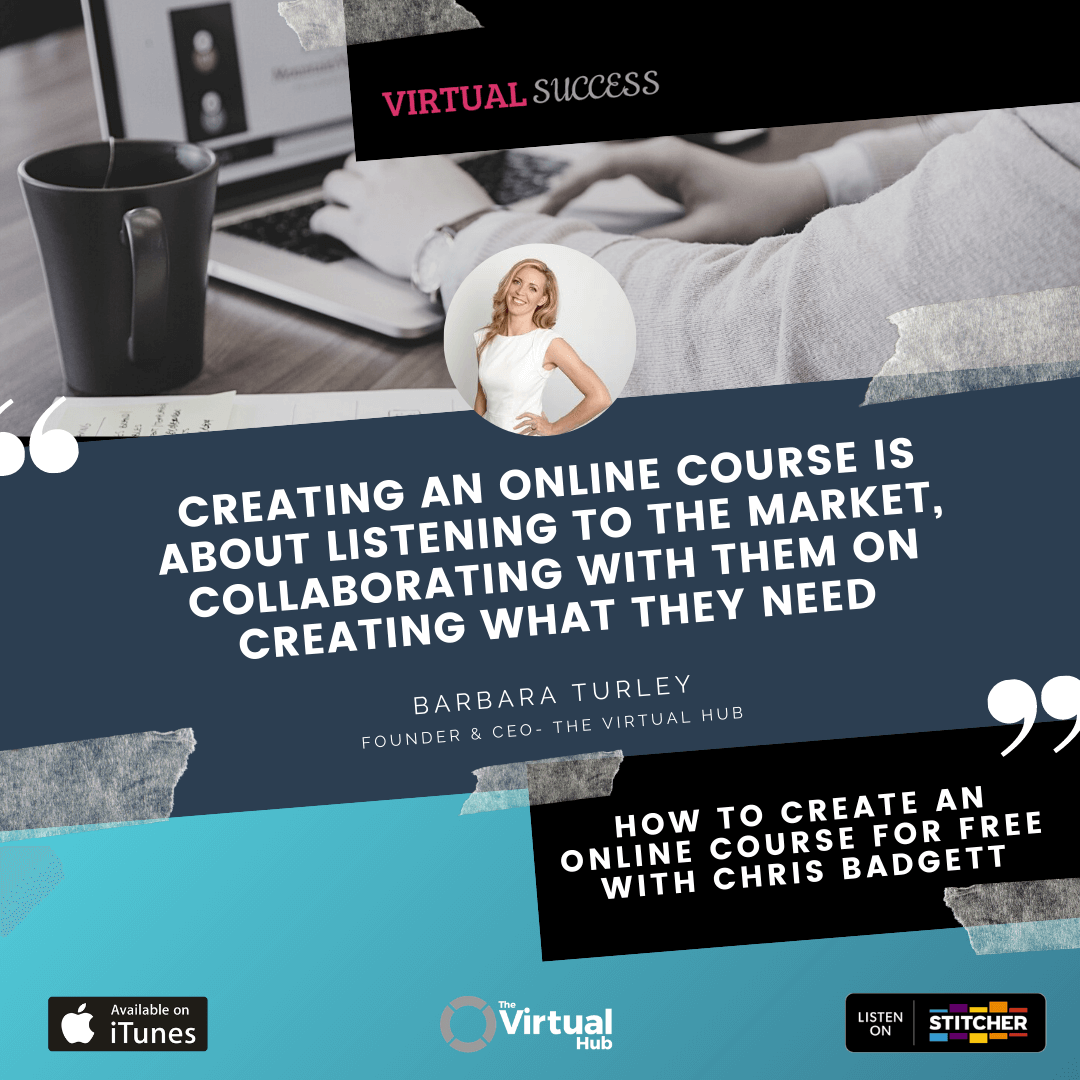
How to Avoid Getting Stuck with the Tech Stack
Chris Badgett: Yeah, it’s a great question, I do see a lot of people get into tech weeds. And I’ve seen millionaire course creators who have nothing but a Dropbox file with a bunch of videos in it. Like when people buy the course they just get access to that Dropbox folder. And I bet if you’re watching this now, you could do that. If you deliver a lot like we talked about, all you need is like a Zoom account or a Skype account and a PayPal account or whatever, like it can be very, very miniature and having a mindset of minimalism is really important. You know, if we get into WordPress as an example, if you already have a WordPress website, I see people sometimes get into, especially if they’re newer to WordPress, there’s all these like page builders and fancy layouts and all this stuff that like, let’s go back and just remember that the person is buying our course. They want the content, they want the transformation, they need the information, they might need you to kind of lay out steps of what to do like assignments or supporting resources to like, help facilitate the learning, the fancy layout is not worth getting sidetracked on. So minimalism is super key especially for the first iteration.
I love that you said outsourcing it, this was this was such a problem in our community at LifterLMS that we created, what we call LifterLMS Experts Program so that like people could be like, you know, there are other people who like build WordPress sites all day long, it can do it for you or like in your world, Barbara with the virtual assistants. I’ve had a virtual assistant for the same one for like six years, and I have no idea where I would be without Kathy. And it’s just like, where do you want to spend your time, it’s hard to not- like think about this whole thing of writing a book, like you know, guilty I tried to write a book. You just needed a computer and a word processor course creation. We’re getting into videos, we’re getting into audio, we’re getting into website, like there’s more tech than the book author thing.
So if you thought writing a book was hard, courses, go minimal, use the the camera that’s already in your laptop and the audio stuff that’s already in your laptop. If you already have a WordPress site for marketing drop it in the free version of LifterLMS build out the outline based on the tips we just described of helping a specific customer get a specific result even if you haven’t created the content yet and get moving hook it up with Stripe or PayPal. Like this is the minimum tech stack and that’s it. That’s how you start.
Barbara Turley: There’s a free version of the lifter plugin for WordPress, which is great.
Chris Badgett: Yeah, so that’s the thing I learned in this four day bootcamp is, this instructional designer dude was like, we weren’t even halfway through it. We already had the prototype built inside of a WordPress site with lifter, it was done, it was like, so you can actually prototype your course idea for free. You don’t have to invest a ton of money, you can get a free paypal account, you know, free lifter. And you know, you have to pay a little bit for your domain name and your website, but you probably already have that anyways. So the money doesn’t need to get in the way to start.
Taking Advantage of the Current Crisis
Barbara Turley: Yeah, and look at the moment. I mean everything. I keep saying this and all these lives we’re doing I mean, the reality is yes, we are going through a crisis time, yes, a lot of businesses have been smashed. But I can tell you one thing we know for sure, everybody’s online, everybody’s on Facebook, everybody’s listening to podcasts. Everybody is online because we’re all at home right and it’s probably the best time ever to actually think about if you’re not online, you know, there’s lots of strategies, you can just start a podcast, you can start a membership site, you can get your online course created, you can get your business digitalized pretty easily. And capitalizing on this moment in time, it’s a moment in time and it may not happen again, so you just kind of try to get out of your own way and get this stuff up and it actually is not difficult. You can get VAs to help, you can hire people online to help but you can also do it yourself if that’s what you really wanna do, but it’s time to sort of get there.
So that brings me to something I want to discuss about pivoting. So some businesses are now going to have to pivot. You know, I’ve seen amazing stories out there like there’s even a shop in Sydney. I heard the story of a shop in Sydney, Australia, that is a chocolate shop, right? They sell chocolates and they very quickly pivoted and got their shop up online. And they did more sales than they normally- now it was Easter, so let’s be honest, that was convenient at the time but they managed to do like explosive sales, even though the shop was closed during a time of crisis time because they got fast and pivoted and got their shop up online. So let’s talk pivot stories, you put out an article, I think it should be today about a SaaS company that got their online course using LifterLMS but got their online course up fast and the idea was to stop churn, stop cancellations and help their customers to get more success and to create more sales. So talk about how can we use this as a pivot story. This is a pivot opportunity.
Chris Badgett: Yeah, there’s a lot of lessons in what Adrian Toby of groundhog did with his pivot to having a, adding an academy to his business. So, um, the first thing is, he was able to move extremely fast because he was already a techie. So he already knew WordPress, but you could experience the same results just by outsourcing to a VA, like the WordPress part like he had his Academy up, it looked great in like a day or a week or something. And then he went about creating the course, he actually created three courses. One was a quickstart course and how to use the software.
Another was how to use his software for his most popular use case customer which funny enough is actually a course creator. And number three, he created a partner program that people could join the, where he trains them on how to sell basically to become power affiliates and promotional partners with his company. He had all that up and running like in less than a month. And you know, it reduces churn, it helped people activate into a software. And you know, it just added value to his community, so he didn’t have to hire more people to manually deliver those, you know, activities. He did it through education in a scalable way. But the pivot is everything.
I mean, just to go on one small tangent, I remember when I was new kind of getting started an online business later in life, I was 30 at the time, I was at a chamber of commerce meeting and I heard- I was really passionate about video marketing, and I heard the woman on stage leading this thing like hundreds of people in the room and she introduced me, the new member. And I heard her say the name of the business that I named, which was Business Showcaser and I was like, Oh, that sounds terrible, that sounds terrible. And I just pivoted, I mean, here I am as an LMS software entrepreneur. I’ve been through like, hundreds of pivots. It’s literally the key to success.
What does it Mean to Pivot your Business?
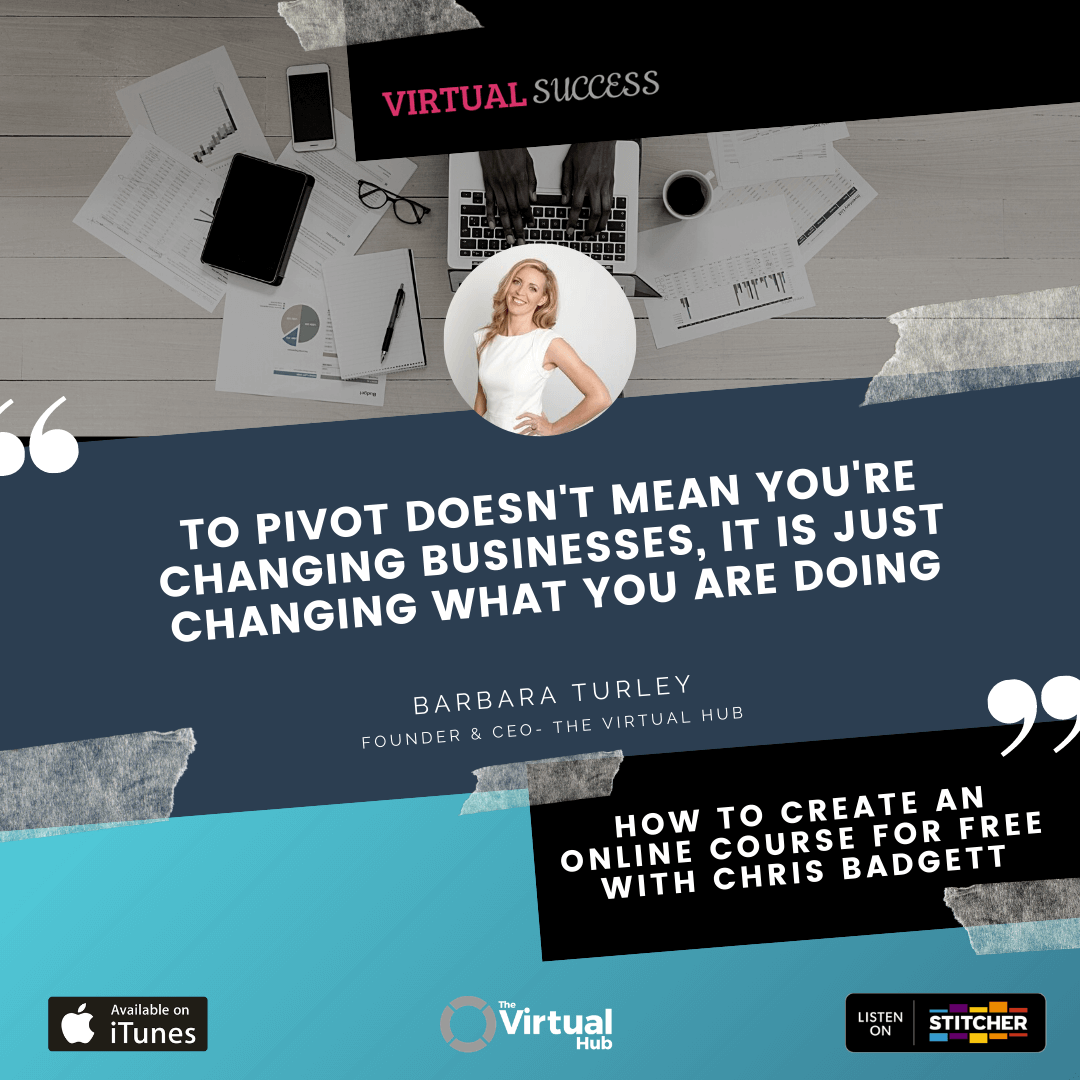
Barbara Turley: Actually, I want to just add there, you know, the pivot doesn’t have to be changing business like so everyone thinks pivoting, is changing what you’re doing. But there are different ways of pivoting in this type of crisis. I mean, you can pivot anytime but sometimes you just add on something. Sometimes it’s a change in how you deliver something. So maybe you’re used to delivering something in person, and now you have to do it online. Well, that’s pivot, it can be the same thing, just a different version, how you deliver, but also it can be [inaudible]
Chris Badgett: A couple ideas just to throw out there, like I’m an entrepreneur, so I can’t turn it off. I have this like, problem solving personality type. So like restaurants, I’m like, you know what, why don’t you create courses on how people can make your signature dish? Have your chef make a course on how to make the thing people buy the most of your restaurant so that people can make it at home while everybody’s on quarantine. I’m literally like, if you’re a gym owner or personal trainer, like this is not new, like yoga DVDs and at home fitness and P90X and all this stuff, like anybody can do that. Like and it can be even better than like a DVD experience now with, that gym owner needs to like come online, just keep doing what you’re already doing. Just mix up the delivery mechanism a little bit.
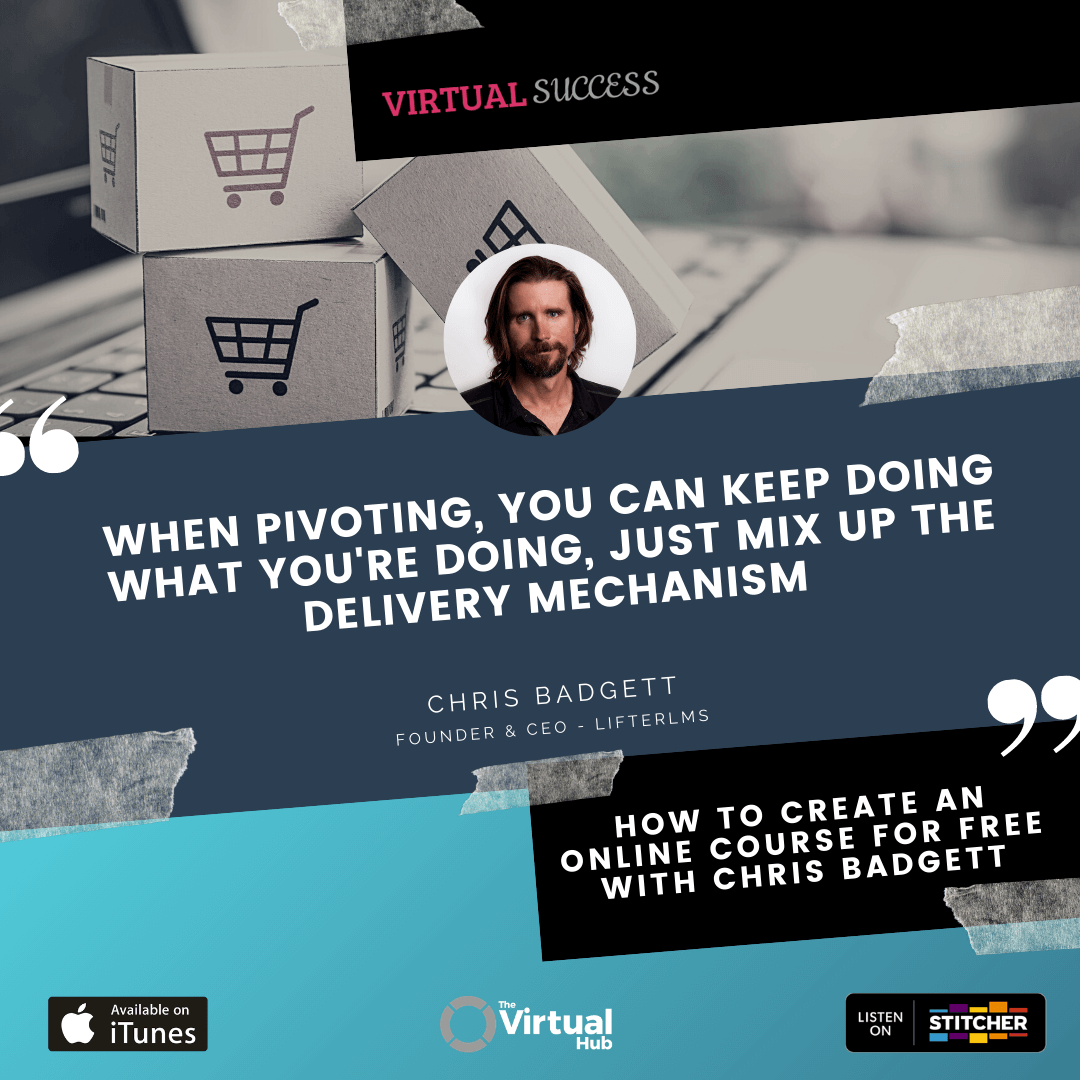
Having the Right Business Mindset in this Crisis
Barbara Turley: Absolutely, yeah. I think it’s just you know, I think it’s a mindset thing too, though. Some people just go straight into the negativity of the whole thing. Business is gone, everything’s decimated, I’m terrible and you know, that might be the case for some businesses, but there are businesses out there that are, you have no choice but to just, you know, find the opportunity wherever you can and that’s kind of what we’re talking about here is that don’t let- you know, if you’ve got an online course you’ve been thinking about it, whatever, just get it up there and just get it out to the world. This is the best time ever to do it and don’t worry about- I mean I don’t even worry about who’s watching these Facebook Lives, doesn’t really matter actually. Because as you keep consistently doing things and you keep putting stuff out there especially in a time like this it will stick and consistency is key of course so that’s the thing. So Chris where can they find out more about you? About LifterLMS? I know you’ve got a great a very very vibrant Facebook group that I’m a part of too and lots of other course creators are in there. Where can they find out more?
Wrapping things up
Chris Badgett: Oh, you can find me at lifterlms.com. I have a podcast for course creators called LMScast and if you just look for LifterLMS on Facebook, you’ll find our Facebook group. So if you’ve thought about making a course go check that out as well.
Barbara Turley: Yeah, absolutely. There’s great tips in there and actually you’ve got your, the 2 hour synopsis of your four day, so that’s today of the four day course creators extravaganza that you just did. So that was that’s really insightful information for anyone to get going. Well, thanks so much for joining us, Chris today on the Facebook Live podcast and if anyone can hear this pitter patter of rain going on my roof at the moment, so that’s great for a podcast but anyway and these times we have to do what we have to do. And everyone if you’re enjoying the podcast, you can catch this on iTunes, on our website, as well as thevirtualhub.com. Give us a rating give us a thumbs up, let us know what you’d like us to talk about. And until next time. Thanks, Chris. Thanks, everyone.
Chris Badgett: Thanks, Barbara.
Outro: Thank you for listening to the Virtual Success Show. If you found this show helpful. Take a moment to share it with a friend so that we can all grow together.
The Hosts
Matt Malouf
Matt Malouf is a passionate business coach, speaker, author and entrepreneur on a mission to help entrepreneurs around the world break the shackles of mediocrity and reach new levels of personal and business success.
Barbara Turley
Barbara Turley is the Founder & CEO of The Virtual Hub, a company that specializes in recruiting, training and managing superstar ‘Virtual Assistants’ in the social media, digital marketing and systems automation space.
